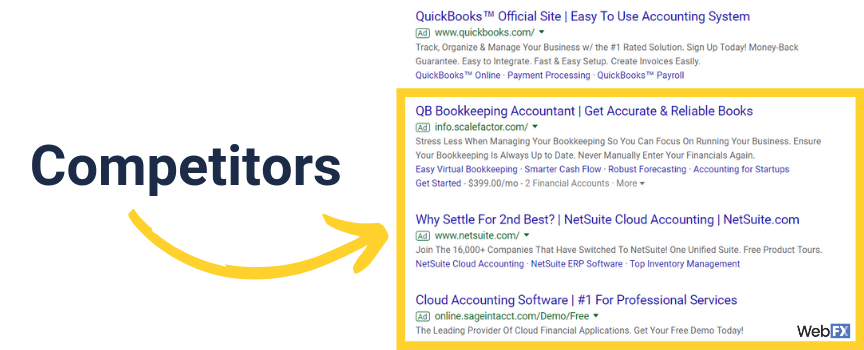-
 Published: May 22, 2023
Published: May 22, 2023
-
 9 min. read
9 min. read
-
 Sarah Berry
Sarah Berry Lead Web Marketing Consultant
Lead Web Marketing Consultant
- Sarah Berry is a Lead Web Marketing Consultant at WebFX. With more than 10,000 hours of experience, she offers practical insights and strategies you can use to grow your digital revenue. When she isn’t polishing her Time Magazine Person of the Year Award, she’s spending time with her flock of ducks.
Even though people that click on ads are twice as likely to purchase a product, your company won’t see those results with a lackluster paid search strategy. That’s why businesses need to reevaluate their pay-per-click (PPC) strategies on a routine basis to find opportunities for improvement. Now, are you ready to take your paid search strategy to the next level, and maximize your return on investment (ROI)? Then keep reading, because this post shares seven simple PPC strategies that’ll help your business earn more from PPC. If you’re looking for professional help with your paid search strategy, browse our Harrisburg PPC services!
WebFX helps companies like yours reach their business goals
“Our marketing department has a lot of key performance indicators that WebFX has always helped us achieve… WebFX has always worked hard to make sure that we’re getting what we need out of the partnership, not just what may seem like the best result.”
HydroWorx
See Case StudyWhat is a paid search strategy?
A paid search strategy is a business’s approach and tactics to advertising via paid search. Implementing simple PPC strategies like using single keyword ad groups (SKAGs) and regularly testing ad copy can enhance click-through and conversion rates, ultimately boosting revenue.
7 paid search strategy tricks
Learn how to improve your paid search strategy with these tactics:
1. Use SKAGs for your ad campaigns
A single keyword ad group (SKAG) allows your business to create hyper-targeted ads for your products or services. With SKAGs, your company targets a single keyword by using multiple match types, like exact, broad, and phrase match. For example, if your business offers 24/7 plumbing services, you may target the following terms:
- [emergency plumbing services]
- “emergency plumbing services”
- +emergency +plumbing +services
This paid search strategy, while aggressive, lets your company develop tailored ad copy for your audience’s specific problem and desired solution. For your business, that results in not only higher click-through rates (CTR) but also conversion rates. If you decide to use SKAGs, however, pull your SKAGs from existing ad campaigns. Launching a SKAG without any performance or campaign data can lead to wasted time, effort, and ad spend. Focus on current campaigns, however, and you can make data-driven decisions about your paid search. For the best results, start with around five SKAGs.
2. Test your ad copy 24/7
Whether you’re launching display ads or search ads, copy is a critical part of your PPC strategy. Without some compelling, must-click ad copy, it’s challenging to earn the kind of results you want from your paid search campaigns. If you stick with ordinary, unoriginal copy, it doesn’t motivate users to click. You can expect the same results with over-the-top copy that complicates your products and services with buzz words. That’s why you need to strike a balance between original and creative. In addition, you also need to A/B test your ad copy. While it may require more time and commitment from your team, testing your ad copy regularly can help your company develop an impressive ad campaign. You can maximize the performance of your campaigns with copy that engages users and earns their attention. Get started with creating different ad copy versions by thinking about these questions:
- What does our target market want or need?
- What separates our business from competitors?
- What unique selling points matter to our audience?
- How does our copy coordinate with our landing page?
You can also A/B test the format of your ad copy. A lot of companies, for example, experiment with sentence case or title case for their ad copy. Studies by WordStream, for instance, support the use of title case because it usually generates a higher CTR. If you’re ready to start incorporating A/B testing in your paid search strategy, start with Google Ads. In a few steps, you can create and launch a campaign experiment or ad variation. Just log into your account, select your campaign, and choose “Drafts & experiments” from the sidebar menu. Don’t stop at one experiment, though. When you first experiment finishes, launch another one!
3. Go beyond Google Ads for PPC ads
Yes, companies that use Google Ads earn an average ROI of $8 for every $1 invested. It’s an impressive return and exceeds PPC’s overall ROI, which is $2 for every $1 spent. That doesn’t mean your business should exclude other advertising platforms from your paid search strategy, though. Take advantage of other platforms, like the following, to reach your audience:
If you decide to invest in social media advertising, research your audience’s favorite social media networks in advance. You want to advertise on their preferred social media networks versus advertising on the most popular networks available. When you experiment with different ad platforms, only invest some of your ad spend into these different networks. If you divide your budget across these platforms evenly, it can hurt the performance of top-performing campaigns and minimize your ROI. Start small and see how your new ad campaigns perform before revising your entire advertising budget.
4. Create dedicated campaigns for voice searches
Every month, there are more than one billion voice searches. Your company can take advantage of that in your paid search strategy. Adding voice search to your PPC strategy, and even your SEO plan, sets your business up for success. Analysts expect early adopters of voice search to increase their digital commerce revenue by 19,6 percent by the end of 2025. You can create a campaign dedicated to voice search by researching your past campaigns. For the best results, it helps to have a high-traffic ad campaign, which provides you with more data and additional opportunities for voice search queries. Once you have your campaign picked, follow these steps to review your keywords:
- Log into your Google Ads account
- Select your ad campaign
- Choose “Keywords” from the sidebar menu
- Click “Search Terms” from the top menu
- Download the report
With your report downloaded, you can search through the data for the phrase “OK Google.” This phrase indicates a voice search. The words that follow “ok google” serve as potential keywords for your voice search campaign. Depending on your industry, as well as business, you may not have any viable voice search keywords. That’s okay. It’s a smart move to see if you do though, because your company could find a whole new (and unsaturated) channel for targeting your market.
5. Make remarketing a part of your paid search strategy
Remarketing is an incredible way to drive sales. With a remarketing campaign, your business gets another chance to convince a shopper or business buyer to contact your company, purchase your product, or visit your store. Businesses often exclude remarketing from their paid search strategy, though. While a remarketing campaign may provide your company with a smaller audience, it offers access to an audience that’s already interested (and aware) of your business. That’s an immense advantage in the digital marketplace! Maximize the impact of your PPC strategy with display or search remarketing campaigns. Get ready to launch your campaign by researching your target audience, reviewing your marketing goals, and evaluating your website data in Google Analytics. Once you’ve completed these steps, build a remarketing audience in Google Analytics. Depending on your site traffic, as well as your target audience parameters, your team may need to wait before launching your campaign, like on Google Ads. That’s because Google Ads requires a specific number of audience members for remarketing campaigns. A display remarketing campaign, for example, requires 100 audience members. In comparison, a search remarketing campaign needs 1000 audience members. Due to the significant difference in requirements, many businesses focus on display remarketing, rather than search. Either way, a remarketing campaign is a powerful way to improve your paid search strategy.
6. Target competitor brand names with search ads
A go-to tip for a lot of PPC strategies revolves around competitor targeting. With PPC, your business can target searches for competitors to alert consumers and business buyers to your company. This strategy can help you earn additional revenue, plus take valuable customers from competitors. You can see an example of this strategy with the following search, “quickbooks accounting.”  In this search, you have paid results for QuickBooks, plus a few competitors. If your company uses this paid search strategy, your team (or PPC agency) must create some stellar ad copy. Users searching for a competitor already know about that company’s benefits. They may even have some loyalty to that business, especially if they’re a current customer. Your ad copy, from your headline to your description, needs to highlight your unique selling points (USPs). It also needs to tap into the needs and pain points of this target audience. For even better results, your copy should highlight the downsides of your competitor and the upsides of your business. While this paid search strategy may not drive a significant number of clicks or conversions, its impressions can help your company build brand awareness. A user may see your ad and then visit your website later, after viewing a competitor’s site. That’s why it’s worth experimenting with this strategy in your PPC campaigns.
In this search, you have paid results for QuickBooks, plus a few competitors. If your company uses this paid search strategy, your team (or PPC agency) must create some stellar ad copy. Users searching for a competitor already know about that company’s benefits. They may even have some loyalty to that business, especially if they’re a current customer. Your ad copy, from your headline to your description, needs to highlight your unique selling points (USPs). It also needs to tap into the needs and pain points of this target audience. For even better results, your copy should highlight the downsides of your competitor and the upsides of your business. While this paid search strategy may not drive a significant number of clicks or conversions, its impressions can help your company build brand awareness. A user may see your ad and then visit your website later, after viewing a competitor’s site. That’s why it’s worth experimenting with this strategy in your PPC campaigns.
7. Get a PPC audit to refresh your PPC strategy
If you’ve read dozens of articles on PPC strategies and launched multiple campaigns without success, you’re not alone. PPC isn’t easy. A lot of companies struggle to create successful, yet cost-effective campaigns. That’s why a PPC audit is a paid search strategy worth considering. With a PPC audit, a PPC agency (or PPC consultant) takes an in-depth look at your campaigns and strategies. They evaluate your keyword research, audience targeting, bid, budget, and more to determine which factors hold your campaign back. Their assessment provides your business with actionable recommendations for improving your campaign. Not to mention, your team also learns about some additional paid search strategies specific to your industry, products, and services. While a PPC audit isn’t free, it saves your business money in the long-term. Based on your agency or consultant’s feedback, your company can improve your campaign, which can result in a higher CTR, lower CPC, and a greater ROI.
Need a custom paid search strategy for your business?
If you’re looking for a custom paid search strategy that drives an impressive ROI for your business, contact WebFX. With our suite of digital marketing services, we’ve helped our clients earn more than $10 billion in revenue and more than 24 million leads in the past five years. Contact us online or call us at 888-601-5359 to learn more about our results-driven PPC services.
-
 Sarah Berry is a Lead Web Marketing Consultant at WebFX. With more than 10,000 hours of experience, she offers practical insights and strategies you can use to grow your digital revenue. When she isn’t polishing her Time Magazine Person of the Year Award, she’s spending time with her flock of ducks.
Sarah Berry is a Lead Web Marketing Consultant at WebFX. With more than 10,000 hours of experience, she offers practical insights and strategies you can use to grow your digital revenue. When she isn’t polishing her Time Magazine Person of the Year Award, she’s spending time with her flock of ducks. -

WebFX is a full-service marketing agency with 1,100+ client reviews and a 4.9-star rating on Clutch! Find out how our expert team and revenue-accelerating tech can drive results for you! Learn more
Try our free Marketing Calculator
Craft a tailored online marketing strategy! Utilize our free Internet marketing calculator for a custom plan based on your location, reach, timeframe, and budget.
Plan Your Marketing Budget
Table of Contents
- What is a paid search strategy?
- 7 paid search strategy tricks
- 1. Use SKAGs for your ad campaigns
- 2. Test your ad copy 24/7
- 3. Go beyond Google Ads for PPC ads
- 4. Create dedicated campaigns for voice searches
- 5. Make remarketing a part of your paid search strategy
- 6. Target competitor brand names with search ads
- 7. Get a PPC audit to refresh your PPC strategy
- Need a custom paid search strategy for your business?

Proven Marketing Strategies

Proven Marketing Strategies
Try our free Marketing Calculator
Craft a tailored online marketing strategy! Utilize our free Internet marketing calculator for a custom plan based on your location, reach, timeframe, and budget.
Plan Your Marketing Budget
What to read next






